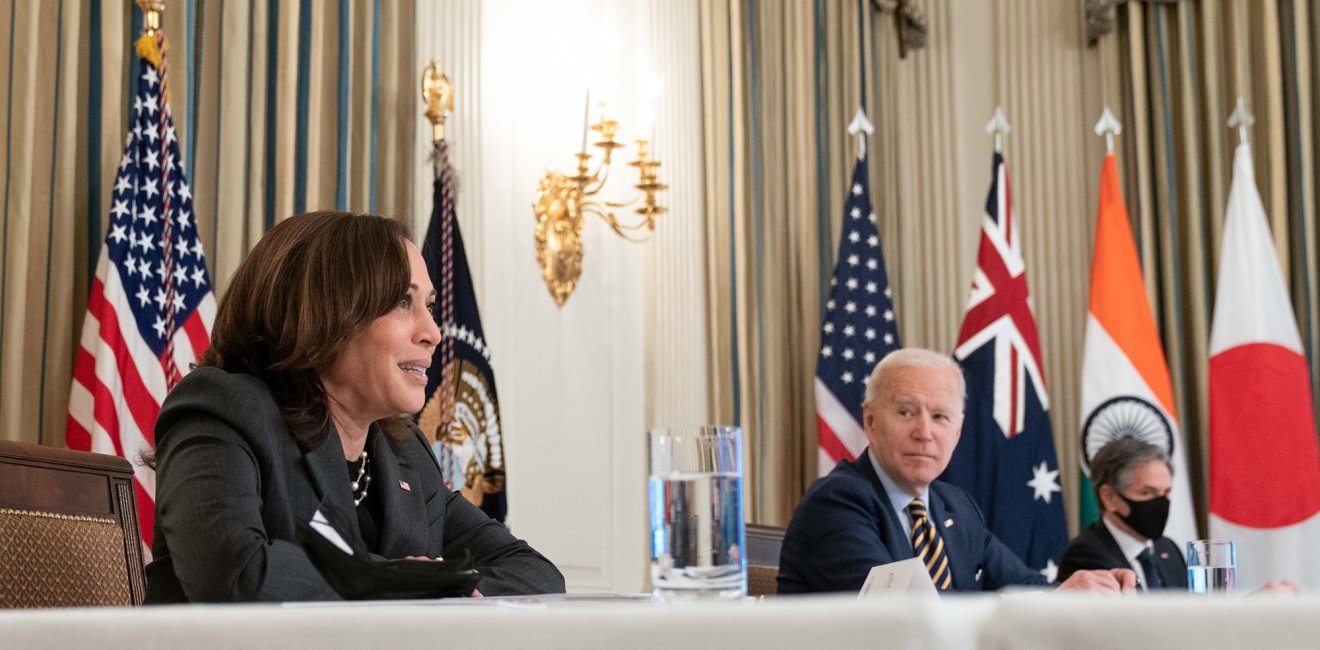
A blog of the Indo-Pacific Program
With its increasing geopolitical importance against China, salience in the Biden administration’s agenda for the Indo-Pacific, and growing success marked by the first-ever in-person leaders’ summit in September 2021, the Quadrilateral Security Dialogue (the Quad) of Australia, India, Japan, and the United States has gone from strength to strength over the past year and become a central forum in the region. These milestones range from vaccine diplomacy and cooperative technological development to the latest iteration of the Malabar military exercises. In addition to these diplomatic engagements over the past year, rhetorical support for democracy in Myanmar became a consistent feature of Quad communiques and joint statements.
However, little concrete policy action jointly or individually has occurred in the eight months since the February 1st coup, and even the United States’ imposition of targeted sanctions receded into the background. Although the Quad countries express a commitment to returning democracy to Myanmar, the Quad countries do not view assertive action on Myanmar as in their interest and therefore decline to act, which exposes limits to the grouping’s willingness to promote democracy in the Indo-Pacific.
The Quad’s Policy Towards Myanmar
Since the February 1st military takeover in Naypyidaw, the Quad has consistently expressed a desire for democracy to return to Myanmar. On February 18th, 2021, just two three weeks after the coup, U.S. Secretary of State Antony J. Blinken held a call with the Quad foreign ministers that discussed “the urgent need to restore the democratically elected government in Burma, and the priority of strengthening democratic resilience in the broader region.” In March, the first-ever Quad leaders’ summit put out a joint statement reiterating this point, along with a characterization of the “shared vision” of the Indo-Pacific being one “anchored by democratic values.” An August senior officials meeting further discussed “promoting democracy and human rights,” as well as the “ongoing crisis in Burma.” During the in-person leaders’ summit in September 2021, the statement reiterated that “[the leaders] are committed to building democratic resilience in the Indo-Pacific and beyond. We continue to call for the end to violence in Myanmar, the release of all political detainees, including foreigners, engagement in constructive dialogue, and for the early restoration of democracy.”
Regardless of the Quad’s language about restoring democracy in Myanmar, however only the United States has taken concrete punitive steps against the junta. Shortly following the coup, the United States began implementing a series of steadily escalating targeted sanctions against the coup leaders, their families, and the military’s extensive network of businesses. Although the United States reached out to the National Unity Government (NUG) in August and made an agreement with China in September to delay the credentialing of the junta’s UN representative, the U.S. response has been somewhat limited beyond its sanctions. This can specifically be seen in its deference to the stalled and ineffectual ASEAN-led Five-Point Consensus process. Outside economic sanctions of limited leverage, little concrete pressure has been placed on the junta. Notably, the kinds of secondary sanctions that would truly bite remain uninitiated, and the U.S. government has not recognized the NUG.
Meanwhile, fellow Quad countries Australia, India, and Japan have refrained from taking even these limited policy actions. None of the countries have issued the kind of targeted sanctions imposed by the United States. Although Australia suspended a mil-to-mil program and redirected its humanitarian aid, Canberra also reiterated that it recognizes “states” not “governments,” which indicates its preference to defer on supporting the opposition. Indeed, Australia’s Foreign Minister argued that sanctions beyond its longstanding arms embargo would be contrary to Australian interest in maintaining its influence in Myanmar. Japan for its part may have halted new foreign aid approvals, but its businesses continue to operate in Myanmar (at increased risk, of course). This policy accords with Japan’s historical “ideological neutrality” towards the rulers of Myanmar. India, meanwhile, has worked to court Myanmar away from China in the past, and the country is the “lynchpin” of New Delhi’s Act East Policy, so it remains quite risk-averse. Thus, India sent military representatives to attend the junta’s parade in March 2021, and it voted to abstain (alongside a variety of authoritarian countries) during the UN General Assembly vote criticizing the junta. An Indian arms company also reportedly supplied the junta with coastal surveillance technology and anti-air capabilities as well. In essence, this is a “wait-and-see approach.”
A Lack of Interest in Policy Action
Fundamentally, countervailing interests impede the Quad’s ability to act on Myanmar and democracy writ large. Even the relatively active Biden administration has been careful to avoid alienating more authoritarian allies and partners, such as the Philippines and Vietnam, in the Indo-Pacific with democracy promotion. For Japan, Australia, and India, they fear that opposing the junta will lead it further into China’s arms or destabilize the already precarious situation, as well as jeopardize substantial economic relationships. Importantly, Japan and India both had more approved foreign investment in Myanmar than the United States in 2020, which highlights the greater blowback risk carried by Japanese and Indian policy actions. Additionally, the grouping hopes to court ASEAN and nullify concerns amongst Southeast Asian countries that the Quad could supplant it and anger Beijing. Getting ahead of ASEAN on Myanmar would be counter to that mission. Quad statements discussing the importance of “ASEAN centrality” and the “Five-Point Consensus” on Myanmar point towards this interest. Additionally, none of the three countries desires political instability in Myanmar: Australia emphasizes the importance of “political stability”; India’s stance continues to be driven by concerns about its border and refugee flows; and Japan worries about threats to its investments in Myanmar and the wider region. Finally, all three traditionally refrain from full-throated democracy promotion. Thus, in the end, hard calculations of interest outweigh rhetorical commitment to democracy.
Instead, Australia, India, and Japan prefer a backdoor approach to resolving the crisis through negotiation, but whether it will be successful is another question altogether. Although some have argued that India and Japan’s networks amongst the military could support a negotiated solution to the crisis, the military does not appear interested in any sort of diplomatic process that incorporates the opposition. Even China has found the junta a difficult partner and consequently hedges with ties to ethnic armed organizations and the ousted-National League for Democracy. ASEAN meanwhile is internally divided, and little hope exists for actual agreement as to which side to back in Myanmar or the implementation of the largely defunct Five-Point Consensus. In this context, Japan’s envoys appear unable to make much headway, India’s approach to engagement with Myanmar’s neighbors has not resulted in much progress, and Australia reportedly continues to hold meetings with both sides but continues to deflect on questions of recognition.
Delaying and Deferring on Democracy
The Quad’s policy approach to Myanmar ultimately belies its expressed commitments to an Indo-Pacific that is “free, open, inclusive, healthy, anchored by democratic values, and unconstrained by coercion” and to “building democratic resilience” in the region. As war continues to engulf Myanmar, the Quad’s approach is inadequate to resolve the crisis, and the risk of Myanmar becoming a failed state with wider impacts on the region is growing. As the Quad’s stance on Myanmar demonstrates, actually advancing the cause of democracy on the ground often runs up against other national interests and priorities. Indeed, the United States has long grappled with “hypocrisy” surrounding its human rights and democracy promotion.
But, if the Quad wishes to take steps to oppose democratic rollback, there is more that it could do. Most prominently, this includes formally recognizing the NUG as the legitimate government (as the European Parliament recently voted to do), applying more diplomatic pressure on ASEAN as a whole and bilaterally with important actors in the region, and imposing sanctions on key junta assets, likely through secondary sanctions. Taking these policy options will require hard choices and tradeoffs, but, if the grouping wishes to advance democracy in the Indo-Pacific, it may be necessary to adopt a firmer stance on democracy in Myanmar.
Follow the Asia Program on Twitter @AsiaProgram. or join us on Facebook.
The views expressed are the author's alone, and do not represent the views of the U.S. Government or the Wilson Center. Copyright 2020, Asia Program. All rights reserved.
Author


Indo-Pacific Program
The Indo-Pacific Program promotes policy debate and intellectual discussions on US interests in the Asia-Pacific as well as political, economic, security, and social issues relating to the world’s most populous and economically dynamic region. Read more





